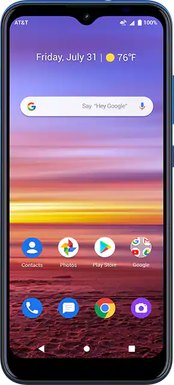

Software Environment:
PlatformThe family of the operating system like Android, iOS, Windows Phone/Mobile, Palm OS, etc. Android
Operating SystemPre-installed (usually embedded) operating system which the device was released with. Google Android 10 (Q)Google Android 10 (Q)
Software ExtrasNavigation software, voice recognition, face recognition, personal assistant app, etc. Voice Command , Navigation softwarepre-installed , Intelligent personal assistantLearning personal assistant based on artificial intelligence (AI) , Face RecognitionFace identification by built-in camera
Application processor, ChipsetApplication processor, Chipset:
CPU ClockFrequency of the square signal which schedules the internal operation of microprocessor (synchronous sequential logic). The current consumed by the processor is approximately proportional to clock rate. 2000 MHz
CPUManufacturer part number and most important characteristics of the IC which includes the main application processor or processors MediaTek Helio P22 MT6762, 2018, 64 bit, octa-core, 12 nm, IMG PowerVR GE8320 GPUMediaTek Helio P22 MT6762, 2018, 64 bit, octa-core, 12 nm, IMG PowerVR GE8320 GPU
Operative MemoryOperative Memory:
RAM TypeType of volatile memory IC which specifies RAM architecture, timing characteristics, refresh mode, voltage levels and physical design of the IC. Two major types of random-access memory is static RAM (SRAM) periodically refreshed dynamic RAM (DRAM). LPDDR4x SDRAM
1600 MHzClock frequency of the RAM databus (not necessarily equivalent to data transfer frequency). The width of the databus (e.g. 64 bit), RAM type (e.g. DDR SDRAM), number of channels and clock rate (e.g. 200 MHz) determines peak transfer rate
RAM Capacity (converted)RAM capacity in binary bytes (KiB: 1024 bytes, MiB: 1024 KiB, GiB: 1024 MiB) 3 GiB RAM
Non-volatile MemoryNon-volatile Memory:
Non-volatile Memory InterfaceInterface (e.g. UFS 2.0, eMMC 5.1, moviNAND) which determines physical layer (width, clock rate, lanes, protocol) of data transfer between the application processor and the NV memory eMMC 5.1
Non-volatile Memory Capacity (converted)The value of ROM capacity converted to the most appropriate units (KiB: 1024 bytes, KB: 1000 bytes, MiB: 1024 KiB, MB: 1000 KB, GiB: 1024 MiB, GB: 1000 MB) 32 GB ROM
DisplayDisplayAll parameters that related to display
Display NotchNumber of display notches (or cutouts) 1-notch
Display DiagonalThe distance measured between the furthest corners of the display. In case of display with rounded edges this refers to the diagonal of the smallest bounding rectangle. 165.1 mm
6.5 inchDisplay Diagonal in inches
ResolutionHorizontal and vertical resolution of the primary display. In case of display with rounded edges this refers to the smallest bounding rectangle. 720x1560
Horizontal Full Bezel WidthDefined as the sum of width of left and right vertical display bezels. If the display panel is located in the middle width of left and right bezels are the same and their width is the half of the full bezel width. 7.01 mm
Display Area UtilizationRegular display area per regular front panel area ratio. This approximated indicator does not count with possible rounded corners (neither on front panel nor on display) or display notches, holes. 79.9%
Pixel DensityIndicates the number of pixels per inch 264 PPI
Display TypeDisplay technology, e.g. Color/ monochrome e-ink, STN, PM-OLED, AM-OLED, TN-TFT, IPS TFT, ASV TFT, MVA TFT, PVA TFT, PLS TFT Color IPS TFT LCDColor IPS-TFT (In-Plane Switching - Thin Film Transistor) is also called Super TFT LCD. This is an active matrix LCD technology developed by Hitachi Ltd. in 1996. display
Number of Display ScalesMaximal number of displayable colors or scales 16.8M
Scratch Resistant ScreenUsual types: Gorilla Glass generations, DragonTrail/X, Sapphire Glass Gorilla Glass 5
Primary Camera SystemPrimary camera usually has better imaging capabilities than secondary camera if any
Camera PlacementRefers to the placement of the primary camera on the device. Front, rear or rotatable. Generally rear. Rear
Camera Image SensorRefers to the semiconductor technology of image sensor (FSI CMOS, BSI CMOS, etc.) CMOSComplementary MOS circuit
Number of effective pixelsA measurement of the maximum pixel number at which the camera can take a picture, often referred to as Megapixels (when horizontal and vertical measurements are multiplied) 13.0 MP camera
Aperture (W)Wide-angle aperture of lens or aperture of lens in case of camera without optical zoom f/2.20
ZoomA feature that changes the focal length of the lens of a camera. Optical zoom requires the lens to move in and out, providing high-quality close ups from a distance 1.0 x optical zoom
FocusCD AF, PD AF, Laser AF, etc. No / Not supported means there is no adjustable optical system or no camera built-in at all PD AFPhase-detection (PD) is a passive autofocus system which measures the phase difference between a two images to reach correct focus.
Video RecordingA measurement of the maximum horizontal and vertical pixel numbers at which the primary camera can capture video 1920x1080 pixel
30 fpsRecording frame rate when recording video at maximum resolution
FlashA flash is used to brighten dark areas when taking photographs; is also used as a flashlight. This field contains the exact type of the flash. single LEDAlso known as mobile light
Camera Extra FunctionsPopular extra features of the primary camera: EIS, EIS for video, OIS, OIS for video, Face detection, 3D photo, HDR photo, HDR video, Macro mode, Panorama Photo, Red-eye reduction, Refocus, Smile detection, Slow motion video, Burst mode, Face Retouch HDR photoHigh dynamic range image recording , Burst mode , Touch focus , Panorama Photo , Face detection , Face tagging , Smile detection , Face retouch
Aux. Camera Image SensorAuxiliary camera image sensor technology in at least dual lens setup CMOSComplementary MOS circuit
Aux. Camera Number of Pixels Number of effective pixels of Auxiliary Camera (2nd camera of primary camera system) in at least dual lens camera setup 4.9 MP aux. cam
Aux. Camera Aperture (W)Wide-angle aperture of aux. lens or aperture of aux. lens in case of aux. camera without optical zoom f/2.20
Aux. Camera Extra FunctionsPopular extra features of the aux. camera: OIS, EIS, HDR photo HDR photoHigh dynamic range image recording , Burst mode
Aux. 2 Camera Image SensorAuxiliary 2 camera image sensor technology in at least triple lens setup Mono CMOSMonochrome CMOS (Complementary MOS circuit)
Aux. 2 Camera Number of PixelsNumber of effective pixels of Auxiliary 2 Camera (3rd camera of primary camera system) in at least triple lens camera setup 1.9 MP aux. 2 cam
Aux. 2 Camera Aperture (W)Wide-angle aperture of auxiliary 2 lens or aperture of aux. 2 lens in case of aux. 2 camera without optical zoom f/2.40
Aux. 3 Camera Image SensorAuxiliary 3 camera image sensor technology in at least quad lens setup No
Aux. 4 Camera Image SensorAuxiliary 4 camera image sensor technology in at least penta lens setup No
Secondary Camera SystemSecondary Camera SystemWidely used for video telephony or taking selfies
Secondary Camera PlacementRefers to the placement of the secondary camera on the device. Front or rear. Generally front camera for selfies or video call. Front
Secondary Camera SensorRefers to the semiconductor technology of sec camera image sensor (FSI CMOS, BSI CMOS, etc.) CMOSComplementary MOS circuit
Secondary Camera Number of pixelsA measurement of the maximum pixel number at which the sec. camera can take a picture, often referred to as Megapixels (when horizontal and vertical measurements are multiplied) 8.0 MP sec. cam
Secondary Aperture (W)Wide-angle aperture of lens or aperture of lens in case of secondary camera without optical zoom f/2.20
Secondary Video RecordingA measurement of the maximum horizontal and vertical pixel numbers at which the secondary camera can capture video 1280x720 pixel
30 fpsRecording frame rate when recording video by the secondary camera at maximum resolution
Secondary Camera Extra FunctionsPopular extra features of the secondary camera: Face detection, HDR photo, Selfie Panorama, Smile detection, Face Retouch / Face Beautification Burst mode , Face detection , Face retouch
Sec. Aux. Cam. Image SensorImage sensor technology of sec. auxiliary camera in at least dual lens secondary camera setup No
Built-in SensorsBuilt-in Sensors:
Built-in compassBuilt-in electroinc compass types: 1D, 2D, 3D Yes
Built-in accelerometerAn internal component that senses acceleration components of the device. Used for automatic screen rotation and for games and applications that rely on acceleration measurement on X, Y, and Z axis. Possible types: 1D, 2D, 3D Yes
Additional sensorsBuilt-in ambient (barometer, temperature, altimeter, light, etc.), biometric (fingerprint, HR, step, etc.) and comfort (hall sensor, gesture sensor, proximity, etc.) sensors FP sensorDevice is able to identify the user by using a built-in dedicated biometric fingerprint recogniser sensor placed at the front, rear or any side of the device , L sensorBy measuring the intensity of the ambient light device may control the brightness level of the screen , P sensor
BatteryBattery technology Li-ion
built-inPossible options: removable, built-in
1-cellIn case of high power consumption it is more efficient to connect more than 1 cells in the battery in series to minimize current thus loss.
Nominal Battery VoltageIf there are more than 1 cells in the battery in series connection the nominal resulting battery voltage is the sum of voltage of cells 3.85 Volts
Nominal Battery CapacityIf there are more than 1 cells in the battery in parellel connection the nominal resulting battery capacity is the sum of capacity of cells 4000 mAh battery
Nominal Battery EnergyThe product of battery capacity and nominal voltage determines the maximal nominal stored energy in the battery 15.40 Wh
Talk Time: 12.0 hours
Address: 2457 W. Devon Ave. Chicago, IL 60659, USA
Email: labbek@aol.com
Phone: 1.773.274.3764


